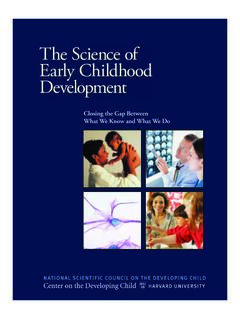Transcription of The Effects of Poverty on Academic Achievement Kendra ...
1 BU Journal of Graduate Studies in Education, Volume 11, Issue 2, 2019 21 The Effects of Poverty on Academic Achievement Kendra McKenzie Abstract Poverty has become one of the most prevalent indicators of Academic Achievement in our schools today. As the number of students raised in Poverty increases, it is vitally important that educators be aware of the Effects of Poverty on student behaviour and learning capacity in the classroom. Educators must incorporate proven strategies in order to help close the gap in Academic Achievement between those raised in Poverty and those raised in more affluent homes. Academic Achievement can be predicted by socioeconomic status (Cede o, Martinez-Arias, & Bueno, 2016; Reardon & Portilla, 2016). In Manitoba, a single parent with one child earns as much as $7,000 below the Poverty line (Brandon, 2018, para.)
2 1). Children raised in Poverty are more apt to experience emotional and social challenges, chronic stressors, and cognitive lags due to significant changes in brain structure in areas related to memory and emotion (Brito & Noble, 2009; Jensen, 2009). The first and best strategy for increasing student effort and motivation is to nurture strong relationships between students and their teachers (Budge & Parrett, 2018). Developing programs that embody respect, embed social skills, and promote inclusive classrooms can assist in closing the Achievement gap for students facing emotional and social challenges (Jensen, 2009). For students dealing with chronic stressors, decreasing the likelihood of lower Academic Achievement can be accomplished by recognizing the signs of Poverty , empowering students, and altering the classroom environment. Building core skills, providing assessments that identify the true root of the problem, and recruiting caring and empathetic staff will assist those students with cognitive lags and changes in brain structure to close the gap in Academic Achievement .
3 It is imperative as educators that we are aware of the Effects of Poverty so that we can implement these strategies and decrease the likelihood of lower Academic Achievement . Common Challenges Viewed in the Classroom There are many challenges faced by children raised in Poverty . Some challenges are long-term obstacles such as chronic stressors and changes in brain structure that effect emotion and memory. Other challenges are more situational causing emotional and social struggles. The mental health issues include high levels of depression among parents and children living in Poverty (Jensen, 2009). Students who have experienced emotional and social challenges may demonstrate acting-out behaviours during their school day (Jensen, 2009). They may also be impatient and have poor impulse control. Their behavioural responses may be limited due to having a caregiver who was not sensitive to their needs as an infant.
4 Jensen (2009) pointed to several reasons for this phenomenon. Many of these students have come from homes where they may have had a teen mother. Parents or guardians are often overworked due to working more than one job to make ends meet. This situation, in turn, causes parents or guardians to inflict harsher discipline and be less sensitive to the feelings and needs of their children. Parents or guardians who have experienced difficulties with school in their pasts are less likely to attend parent-teacher interviews or to be involved in any extra-curricular school activities. Poor emotional health, caused by the lack of parental support, may cause an increase in disruptive behaviour in the classroom. In addition, children raised in Poverty may not have been taught to be polite and may not be socially gracious (Jensen, 2009). They may lack the ability to empathize with others. This lack of empathy, in turn, makes it difficult for these students to work well in cooperative groups with 22 BU Journal of Graduate Studies in Education, Volume 11, Issue 2, 2019 their classmates.
5 This inability to work well with classmates often results in students becoming unwanted participants in groups, adding to their feelings of inadequacy and resulting in the students giving up on a task just before they successfully complete it. Poor social skills, which result in a lack of acceptance from peers, may cause decreases in Academic performance. Children living in Poverty see many chronic stressors, including unsafe neighbourhoods where there are high levels of crime, parents who are making minimum wage which causes a financial strain on the family, parents who are separated or divorced, siblings living in different households, and households that are overcrowded (Johnson, Riis, & Noble, 2009). All of these stressors create a void in the lives of children raised in Poverty , and result in Academic and behavioural issues in school. These students have a higher level of absenteeism, they struggle with focus and concentration, they have significantly more difficulty in comprehension and memory, and they struggle with motivation (Jensen, 2009).
6 In addition, living in homes where there is little parental interaction, fewer books to read, and fewer chances for cognitive stimulation will decrease the children s confidence which, in turn, will lead to future Academic failure (Cede o et al., 2016). Chronic stressors will cause students to underperform in school and either give up or become disinterested in their school work (Jensen, 2009). For all of these reasons, chronic stressors have a significant effect on Academic Achievement . Lastly, children raised in Poverty are more apt to experience cognitive lags due to significant changes in brain structure in areas related to memory and emotion. Poverty may make it difficult for parents to purchase toys and books to promote cognitive stimulation for their children, thereby causing the children to have a lesser vocabulary and a more directed speech (Johnson et al., 2016). Developmental delays are more prevalent for children raised in Poverty as opposed to those raised in more affluent homes.
7 Poor performance on tests when asked to show their knowledge, behavioural problems in the classroom, mental health issues, and emotional problems are also viewed more frequently in those children who have been raised in a lower socioeconomic home. Children raised in Poverty experience changes in brain structure in areas related to memory and emotion (Brito & Noble, 2009). Living in Poverty upsets brain development and will result in behavioural problems in the classroom (Dike, 2017). Stress causes our bodies to release a chemical called cortisol (Jensen, 2009). The buildup of cortisol in our body results in sending weaker neuron signals to the prefrontal cortex and the hippocampus. Both the prefrontal cortex and the hippocampus are crucial for learning, cognition, and working memory. Recurring stress can result in shrinking of neurons in the frontal lobes of a child s brain. This area of the brain is responsible for the child s ability to make judgements, plan, and control impulsivity.
8 It can also cause damage to the hippocampus, which may, in turn, cause a reduction in learning capacity. The amygdala is also affected by the Effects of stressors in the body (Jensen, 2009). The amygdala is the area of the brain that is responsible for controlling emotions. All of these alterations to the neurons in the brain cause an imbalance in the healthy status of the brain. This imbalance, in turn, may shape the patterns of communication and language. Children raised in Poverty who have significant changes in brain structure are faced with many Academic and behavioural challenges. Children raised in Poverty experience many emotional and social challenges, chronic stressors, and cognitive lags due to significant changes in brain structure in areas related to memory and emotion, which result in lower Academic Achievement and more behavioural issues in the classroom. Solutions To Close the Achievement Gap in the Classroom In order to conquer Academic and behavioural challenges faced by children raised in Poverty , teachers need to develop strong relationships with their students, embody respect in their interactions with students, embed social skills in lessons, promote inclusive classrooms, recognize the signs of Poverty , empower students, alter classroom environments, build core skills, provide accurate assessments, and recruit caring and empathetic staff.
9 Building caring BU Journal of Graduate Studies in Education, Volume 11, Issue 2, 2019 23 and supportive relationships with students is the first and best strategy to increase student effort and motivation (Budge & Parrett, 2018). Many children raised in Poverty come to school without the necessary social-emotional responses needed to be successful at developing relationships with their peers and teachers (Jensen, 2013). Children raised in Poverty need to develop relationships with teachers who give them a reliable and positive role model that they can count on and trust. Inappropriate emotional responses in the classroom can be diminished and engagement increased by taking the time to nurture a strong student-teacher relationship. This relationship between the student and his/her teacher is the precursor to any learning happening in classrooms (Budge & Parrett, 2018).
10 If the student does not perceive that this relationship exists, there will be no learning. There is a saying that students will not care what the teachers know until they know that the teachers care. Students who know that their teachers care about them will be more likely to follow what their teachers are modelling, and will feel more confident taking risks and trying out new behaviours in the classroom. This relationship can be nurtured by offering the student the opportunity to learn how to be respectful and develop appropriate social skills. Providing an environment where the students feel included and valued as members of their classroom community will also help to improve their overall mental health. These efforts can assist in closing the Achievement gap for students facing emotional and social challenges (Jensen, 2009). Embodying respect in the classroom involves showing respect to all the students in the classroom, especially when it may seem it is not warranted (Jensen, 2009).

















